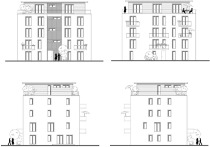Methodologies for the assessment of the Global Warming Potential of biobased materials used in construction
12.10.2021The Global Warming Potential (GWP) is one of the impact categories for Life Cycle Assessment (LCA), a scientific method used to analyze the impacts of goods and services through their entire life cycle. In the construction sector, this method is used to develop Environmental Products Declarations (EPDs), the “building blocks” on which full assessments at building and infrastructure level are performed.
To conduct in-depth independent research into the methodology used to assess the GWP of biobased materials, the consortium hired the consultancy and engineering firms LBP/Sight and Royal HaskoningDHV. The research focuses on biobased materials used in the construction sector and will identify differences in methodology and assumptions, compared to other construction products. Results are expected in Q1 of 2022.
Alessio Rimoldi, Secretary General of BIBM - Federation of the European Precast Concrete Industry: “Achieving a net-zero carbon economy by 2050 is one of the key pillars of the European Green Deal. Evaluating the environmental effects of construction materials and products in an objective way is one of the preconditions for taking the right measures and decisions to mitigate climate change. As a consortium, we want to expand the scientific knowledge around GWP assessment methodologies.”
Dirk-Jan Simons, Senior Consultant sustainability and environment at LBP/Sight: “It is of great importance for the whole building products industry and the construction sector as a whole, that we perform an independent study based on scientific principles, in order to achieve objective rules for a comparative evaluation at building level.”
CONTACT:
Alessio Rimoldi
Federation of the European Precast Concrete Industry / European Concrete Platform
+32 (0)473 950690
Mike Leonard
Chair of the consortium communication group
+44 (0)121 705 1714
+44 (0)7778 842831



